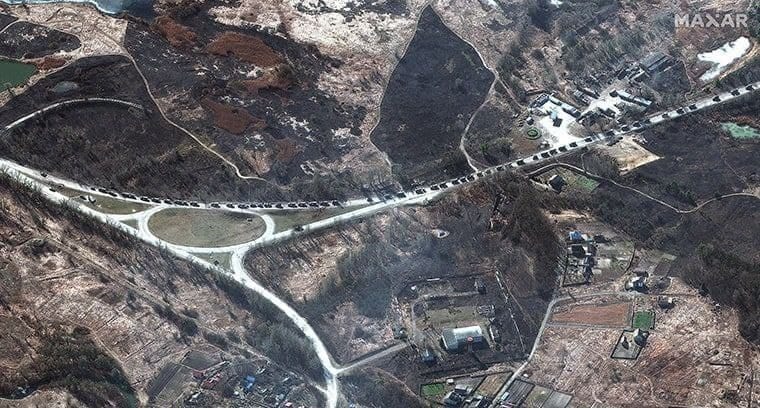Anton’s Story - Part IV: Working Under Russian Occupation
Written by Val Stutz, edited by: Clary Estes. Our conversation with Anton was organized and moderated by our citizen journalist Eugene. Quotes have been edited for clarity and concision.
Anton then told us about the arduous conditions Ukrainian personnel faced during the occupation. There were factors to consider such as personal hygiene, medical supplies, and other essential items and equipment for living in a single place for a long duration. “We were concerned about where we would sleep and where we could find blankets and things to use as makeshift beds.”
Of course, the biggest concern was rationing the food supply. “The food situation got pretty bad. In general, we had a large supply of food, stuff you could store long-term, but we didn’t have a lot of foodstuffs that spoiled quickly like bread or milk. As you’d expect, with every passing day we started to run out of food. By the fifth day, they stopped giving us any bread at all. The lack of bread was a sign that we were running low on food, so we didn’t eat well at all.”
As the staff members feared, the situation in Slavutych was becoming dire as well. “When we talked to our families in Slavutych, we found out that they were also experiencing food shortages, and they had started hearing frequent air raid sirens. In short, my colleagues and I were hungry all the time at the power plant, and our families in Slavutych were hungry as well.”
Anton did not hesitate to express the deep concern he had for his wife and children at that time. “My wife told me about how hungry our kids were, and how they wanted more food. This was very unusual to hear because my children do not normally eat so much. When the grocery stores started to receive deliveries again and work normally, my wife and kids would go and ask for a wide variety of things.”
When the attacks on Kyiv started to intensify, the local power grid was knocked out, and it turned out Chernobyl was part of that power grid. “I can’t remember when exactly, but around the twelfth or thirteenth day of the occupation, there were firefights happening around Kyiv that knocked out the power grid that supplied electricity to the power plant. By the thirteenth day, the power plant was completely without power. For a nuclear power plant, that’s very bad because we have equipment that needs to constantly run—things like fans and other cooling equipment.”
Slavutych was also part of that same power grid, so the city was also without electricity. “The city was in a very bad situation, there was no power at all, along with no gas, which meant that our families could not use their gas stoves to cook, or refrigerators to store frozen food. We knew that everything in our refrigerators would spoil quickly, so everything had to be eaten quickly.”
Fortunately, the power plant was equipped with a backup generator that would function in case of a power outage. However, the one downside to the generator was that it only provided power to essential areas. “The backup generator was designed to keep the safety systems running, it was not intended for the comfort of plant staff, so we were without things like heating, hot water, and so on.”
Since the invasion started at the end of winter, Ukraine was still in the midst of a blistering cold season. “At that time it was still very cold outside, so we had to wear winter coats when we went to sleep, as well as extra winter coats on top so that we wouldn’t freeze.”
The plant staff and their families in Slavutych had to go without electricity for five days, and it ended up being the Russians who restored power. It turned out that the backup generator as well as other equipment were diesel-powered, and the Russians were supplying large quantities of diesel at their own expense—an outcome they were not happy about.
The Russian government decided to connect Chernobyl to a Belarusian power grid. However, the head of the power plant had to negotiate with the Russian commanders to convince them to supply electricity to Slavutych as well. The Russians understood the necessity of maintaining power to the cooling systems and other essential equipment within the power plant, but it was clear that they did not care about the well-being of civilians in the nearby community of Slavutych.
“At the time, Slavutych was not under Russian control, so the Russians had no interest in supporting it. The question of whether or not to provide electricity to Slavutych was the most heated debate between the head of the power plant and the Russian high command, it lasted about two or three days. Our manager stated that we would only accept being connected to a Belarusian power grid on the condition that Slavutych would be connected as well. Our loved ones were there and they needed that power too. Finally, the Russians gave in and everyone had power.”
It was Anton’s manager and the rest of the Ukrainian negotiation team that were heroes in this instance. According to Anton, there were two possible reasons why the Russians conceded. “I believe they agreed to our demands for two reasons: first, they didn’t want to waste any more diesel, and second, they didn’t want there to be any riots at the power station.”
The Russian occupation created a desperate situation for plant workers and the military personnel stationed at Chernobyl, and if the situation was mishandled in any way, the results could have been catastrophic. However, Anton reminded us that thanks to the training he and his colleagues had, they managed to diffuse the situation and continue their work to keep the power plant under control.
Up next—Part V: The battle of Kyiv



